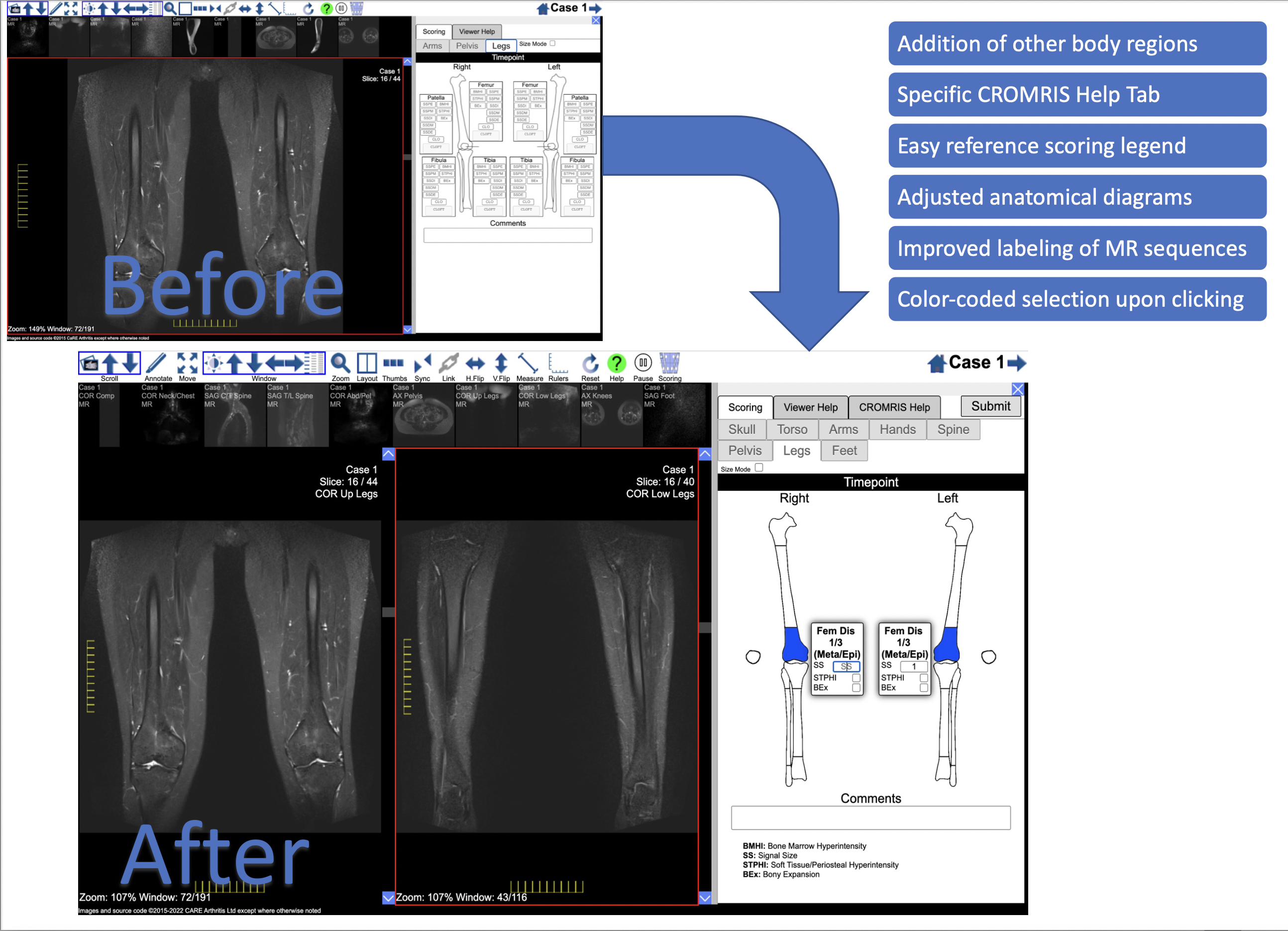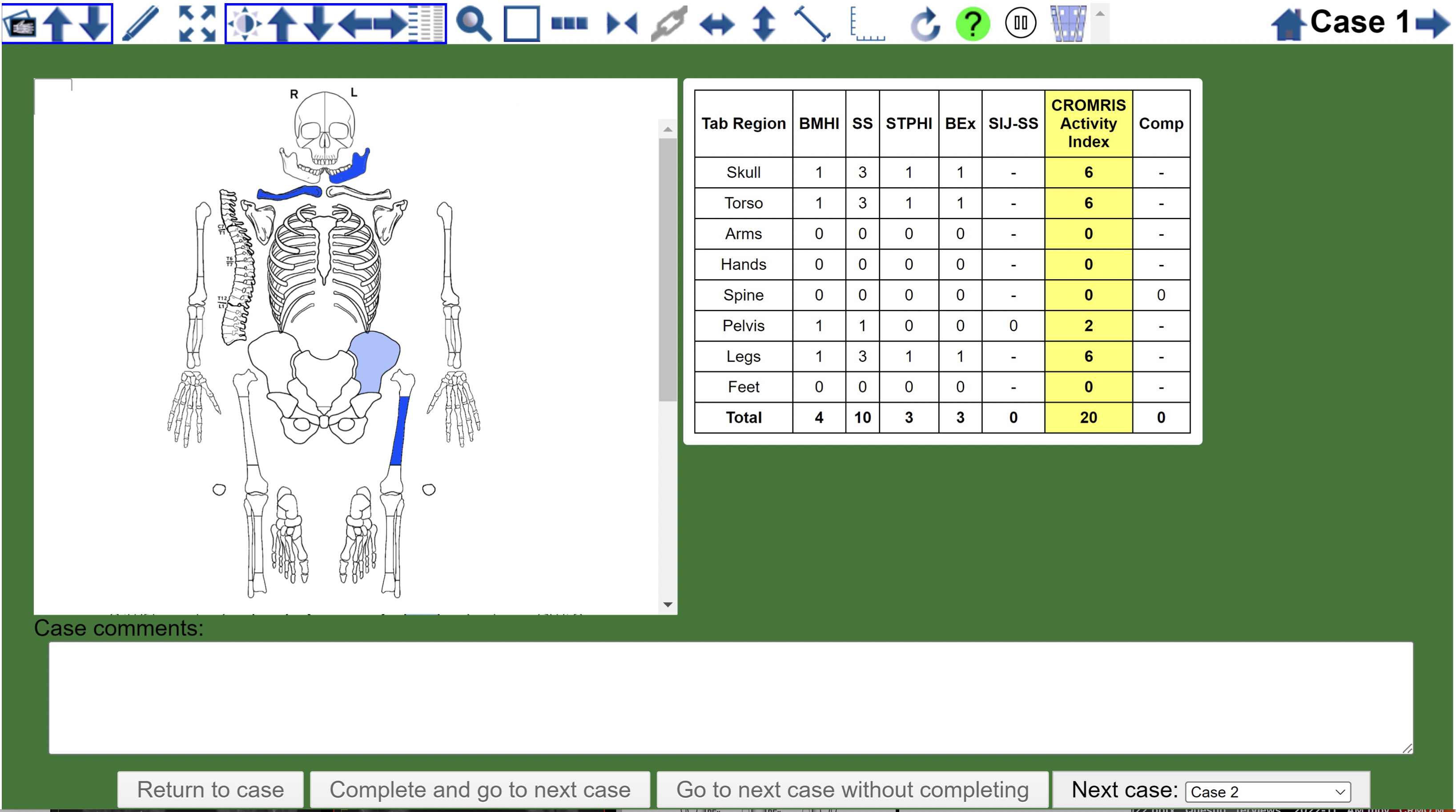Session Information
Session Type: Poster Session A
Session Time: 6:00PM-7:00PM
Background/Purpose: The ChRonic nonbacterial Osteomyelitis Magnetic Resonance Imaging Scoring (CROMRIS) tool was developed to assess specific characteristics of bone and soft tissue inflammation in MRI of patients with CNO, but was labor intensive to utilize. Primary objectives of this study are: 1) to adapt the CROMRIS tool to a web-based platform and 2) assess the usability of this web-based CROMRIS system among radiologists.
Methods: A prototype web-based CROMRIS tool limited to the arms and legs was developed by CARRAs CRMO Workgroup and CARE-Arthritis in 2019. Monthly meetings between software developers, rheumatologists, radiologists and an illustrator led to a beta version that includes the whole body. A purposive sample of radiologists (n=7) provided feedback on the beta version in a demo session on 4/11/22 via semi-structured surveys (Stony Brook University #IRB2021-00033). Usability was assessed in two phases (in 5/2022 and in 12/2022) using the System Usability Scale (SUS), a Likert scale in which respondents indicate their level of agreement or disagreement on a scale of 1 to 5 for 10 statements. Feedback was reported with descriptive content analysis, continuous variables as means and categorical variables as percentages.
Results: A clickable-schematic-based CROMRIS was developed to include all body regions: head (skull/mandible), spine, torso (clavicle, sternum, ribs), pelvis, hands, feet, arms and legs [Figure 1]. Notable features are the ability to immediately highlight a schematic region upon selection to directly input scores and the ability to zoom in on smaller areas. Suggested changes included flipping orientation of hands/feet drawings to match MRI presentation, labeling of individual spine and rib segments, insertion of scoring legend on each tab for reference and creation of a summary page with a composite diagram where one can visualize the location and size of lesions by color as well as a numerical CROMRIS activity index [Figure 2]. A video tutorial and MRI Atlas is on the platform for training (https://www.carearthritis.com/mriportal/crmo/index/). Visual factors and anatomical diagrams were among the features “liked best” by survey respondents. Mean SUS scores increased from 64.5 (below average) to 75 (above average). All respondents agreed that the web-based CROMRIS was “easy to learn” and found that the “various functions of the web-based CROMRIS were well integrated.”
Conclusion: The web-based CROMRIS portal shows good usability amongst radiologists. Studies of inter-rater reliability among experienced pediatric radiologists are underway. Once validated, this tool can be used as a semi-quantitative MRI scoring tool to allow for standardization of reporting output of radiological interpretations of MRI in CNO.
 Figure 1. Example of Web-based CROMRIS Tool on Long Bones of Lower Extremity Before and After Feedback Sessions/Usability Testing
Figure 1. Example of Web-based CROMRIS Tool on Long Bones of Lower Extremity Before and After Feedback Sessions/Usability Testing
 Figure 2. Screenshot of Summary Page for Final Web-based CROMRIS system
Figure 2. Screenshot of Summary Page for Final Web-based CROMRIS system
To cite this abstract in AMA style:
Nuruzzaman F, Sato T, Carbert A, Paschke J, Potts L, Beer M, Huang M, Iyer R, Monsalve J, Ngo A, Stimec J, Thapa M, Hou W, Maksymowych W, Ferguson P, Zhao Y. Development and Usability Testing of Web-based Standardized Scoring Tool for Magnetic Resonance Images from Children with Chronic Nonbacterial Osteomyelitis (CNO) [abstract]. Arthritis Rheumatol. 2023; 75 (suppl 4). https://acrabstracts.org/abstract/development-and-usability-testing-of-web-based-standardized-scoring-tool-for-magnetic-resonance-images-from-children-with-chronic-nonbacterial-osteomyelitis-cno/. Accessed .« Back to 2023 Pediatric Rheumatology Symposium
ACR Meeting Abstracts - https://acrabstracts.org/abstract/development-and-usability-testing-of-web-based-standardized-scoring-tool-for-magnetic-resonance-images-from-children-with-chronic-nonbacterial-osteomyelitis-cno/
